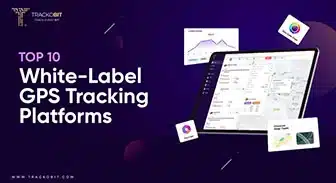-
TrackoBit
Manage commercial vehicles with the new-age Fleet Management Software
TrackoBit -
TrackoField
Streamline your scattered workforce with Field Force Management Software
TrackoField -
Features Resources
-
Blog
Carefully curated articles to update you on industrial trends. -
White Paper
Insightful papers and analysis on essential subject matters. -
Glossary
Explore an alphabetical list of relevant industry terms. -
What’s New
Get TrackoBit & TrackoField monthly updates here. -
Case Study
Explore the cases we solved with our diverse solutions. -
Comparisons
Compare platforms, features, and pricing to find your best fit.
-
About Us
Get to know TrackoBit: our team, ethos, values, and vision. -
Careers
Join the most dynamic cult of coders, creatives and changemakers. -
Tech Support
Learn about our technical support team and services in detail. -
Events
Check out the exhibitions where we left our marks and conquered. -
Contact Us
Connect with us and let us know how we can be of service.
How Fuel Management Software Overcomes 4 Key Challenges?
- Author:Tithi Agarwal
- Read Time:
- Published:
- Last Update: October 31, 2023
Table of Contents
Toggle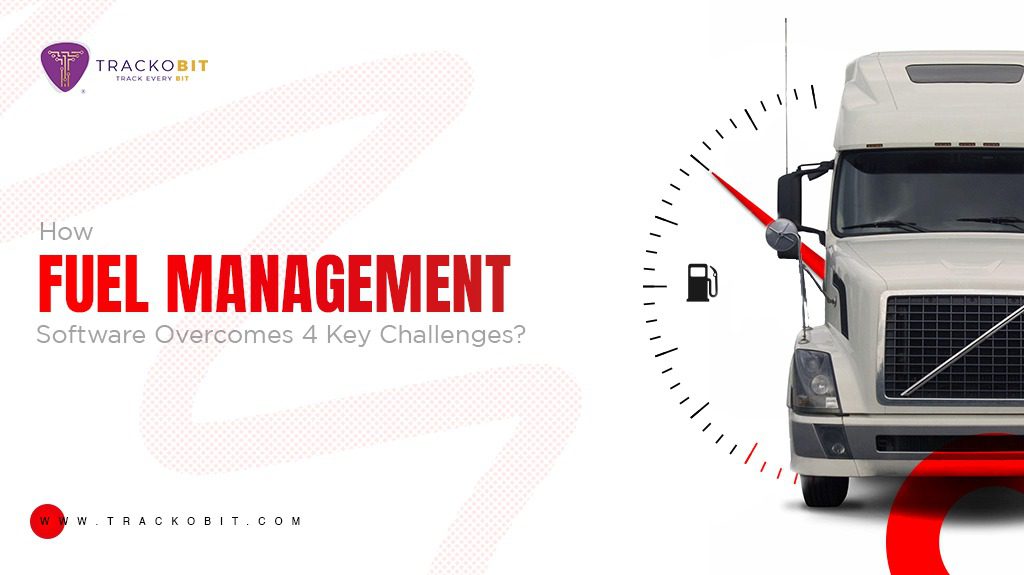
4 challenges that fuel management software can help you overcome are lack of visibility, excess fuel consumption, detecting fuel pilferage, and more.
Table of Contents
Toggle
Fuel is an expense equal to liquid gold for fleet and business. But it is also the biggest pain point for logistic companies.
32% of logistics businesses consider fuel to be the largest expense.
Companies are struggling to contain their fuel consumption and avoid wastage. What they need is fuel management system. That will allow them to curb their fuel use, expenses, wastage and pilferage.
Read this article to learn how to monitor fuel consumption and curb your fuel-related expenses expertly.
What is Fuel Management System and Fuel Economy?
For logistics companies, fuel is of great value as it affects operational costs. This drives the need to adopt fuel management.
Now you ask, what is fuel management? Let us help you understand.
Fuel management is about monitoring and controlling fuel consumption through various systems and solutions that will help you optimise it. To do so easily, it’s best to use fuel management software which is a part of fleet management software.
Industries across are widely using the software. It uses telematics-based tools and analytics to capture fuel consumption data. Using the information, managers can improve their fuel economy.
Now you might be wondering – what is this fuel economy?
Fuel economy or fuel efficiency indicates how long a vehicle can run on a unit of gas. Routine maintenance, proper driving practices, and tire care are some ways to improve it. That is essential for improving the fuel efficiency of the trucks. It can easily be managed through fleet management software.
How Does Fuel Management System Work?
The fuel management system leverages GPS trackers technology and IT to generate a variant of comparison graphs depicting the distance travelled by the fleet from point A to point B. These reports and graphs are key to gaining operational insights for managers. Through them, they can identify vehicle usage and anomalies faced during trips.
Using a fuel management system will provide precise fuel consumption data, helping you identify reasons for excessive fuel usage. The reason could be incorrect tire pressure, idling, or harsh driving practices. But most importantly, it will alert you whenever there is unusual fuel draining, fuel fraud, or fuel overconsumption.
What Problems Do Fuel Monitoring Systems Resolve?
The fuel management system is not just for curbing and monitoring fuel consumption but also for solving other problems that come along with fuel mismanagement.
Problem 1: Lack of Visibility
Without a fuel monitoring system in place, managers feel blindsided. This is because they don’t have access to accurate and real-time information on fuel consumption, trip status, and fleet conditions. The only way for them to gain updates is by connecting with the drivers or when they are handed over the fuel bills.
Solution 1: Real-time Fuel Monitoring
But with the fuel management system, being blindsided is out of the question. That is because fleet managers can monitor fuel consumption or fuel per mile through the software’s dashboard. Managers have complete transparency in fleet operations as they get insight-rich reports in real-time, which helps them stay in sync with the on-ground activities of the fleet.
Problem 2: Latency in Reaction
Building upon the previous point, managers are bound to react and not respond when suddenly bombarded with news. This unawareness of the fleet consuming an abnormal amount of fuel causes a delay in reaction from the manager’s side. And the decisions taken during this time might not be the best.
Solution 2: Real-time Fuel Insights
But with the fuel management system, fleet managers are well aware of the amount of fuel being consumed and the reason behind the abnormal fuel usage. The system is constantly providing real-time updates and insights through fuel charts.
Also, with the vehicle health status in front of them, managers are able to detect poor engine performance, which is causing excess fuel use. This can be fixed before commencing the trip to avoid sudden breakdowns.
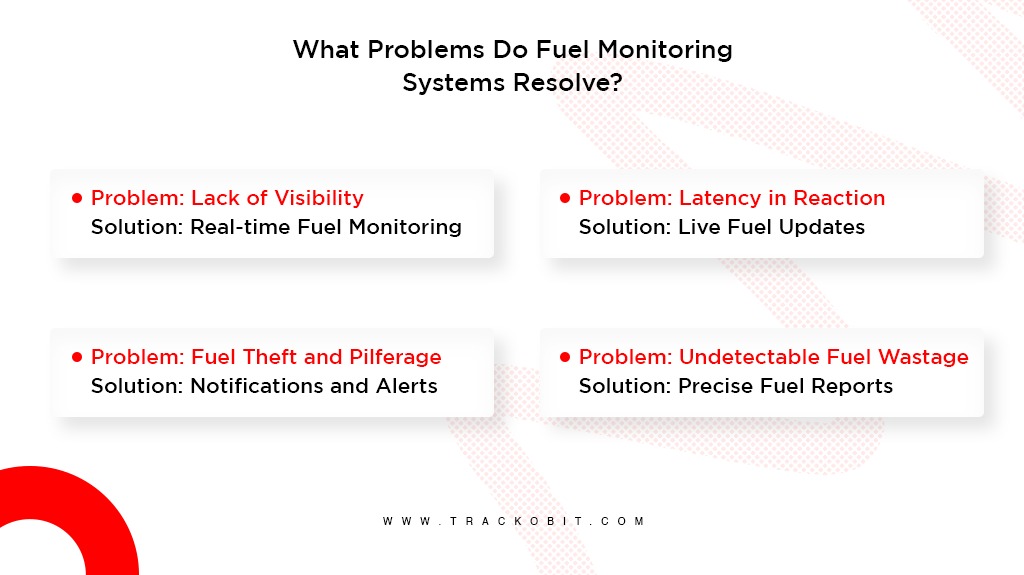
Problem 3: Fuel Theft and Pilferage
Fuel theft or pilferage is common during trips. They have a negative effect on the operational cost as fuel expenses increase, leaving very little for other aspects or resources. This fraudulent practice becomes even more frequent when drivers know that no monitoring is done.
Solution 3: Notifications and Alerts
But fuel monitoring proves this wrong. The system sends notifications and alerts when it detects unusual speeds of fuel filling or ejection levels. The system analyses the minute-by-minute fuel usage of each vehicle in the fleet. Such data will enable managers to assess the amount of stolen fuel with the exact location, time and other facts supporting the claim.
This will further improve the operations by eliminating malpractices during the trips.
Problem 4: Unable to Detect Fuel Wastage
Managers only get to know about fuel wastage when it comes to reimbursing or paying fuel bills. This is generally at the end of the trips. By that time, the damage had been done. Neither are they able to detect excess fuel use, nor are they able to detect harmful driving practices like
- Idling
- Route deviation
- Harsh cornering
- Unnecessary acceleration.
Solution 4: Precise Fuel Reports
The combination of fuel management and fleet tracking is able to predict fuel wastage which is key to improving a vehicle’s fuel efficiency. The fuel management system provides analytical reports that contain precise and real-time data and metrics.
Data like initial fuel level, final fuel level, engine hours, idling time, fuel consumed in motion, and much more. This helps detect hard acceleration, deceleration, and idling, preventing substantial fuel costs.
Summing Up!
An efficient fuel monitoring software is the need of the hour, seeing the ever-rising fuel prices. With its help, logistics companies can devise fuel-optimisation strategies, minimise consumption, and maximise the fleet’s fuel economy.
TrackoBit offers fuel management software that provides access to crucial metrics that can be key to solving some of the major hindrances in optimising fleet trips.
Tithi Agarwal is an established content marketing specialist with years of experience in Telematics and the SaaS domain. With a strong background in literature and industrial expertise in technical wr... Read More
Related Blogs
-
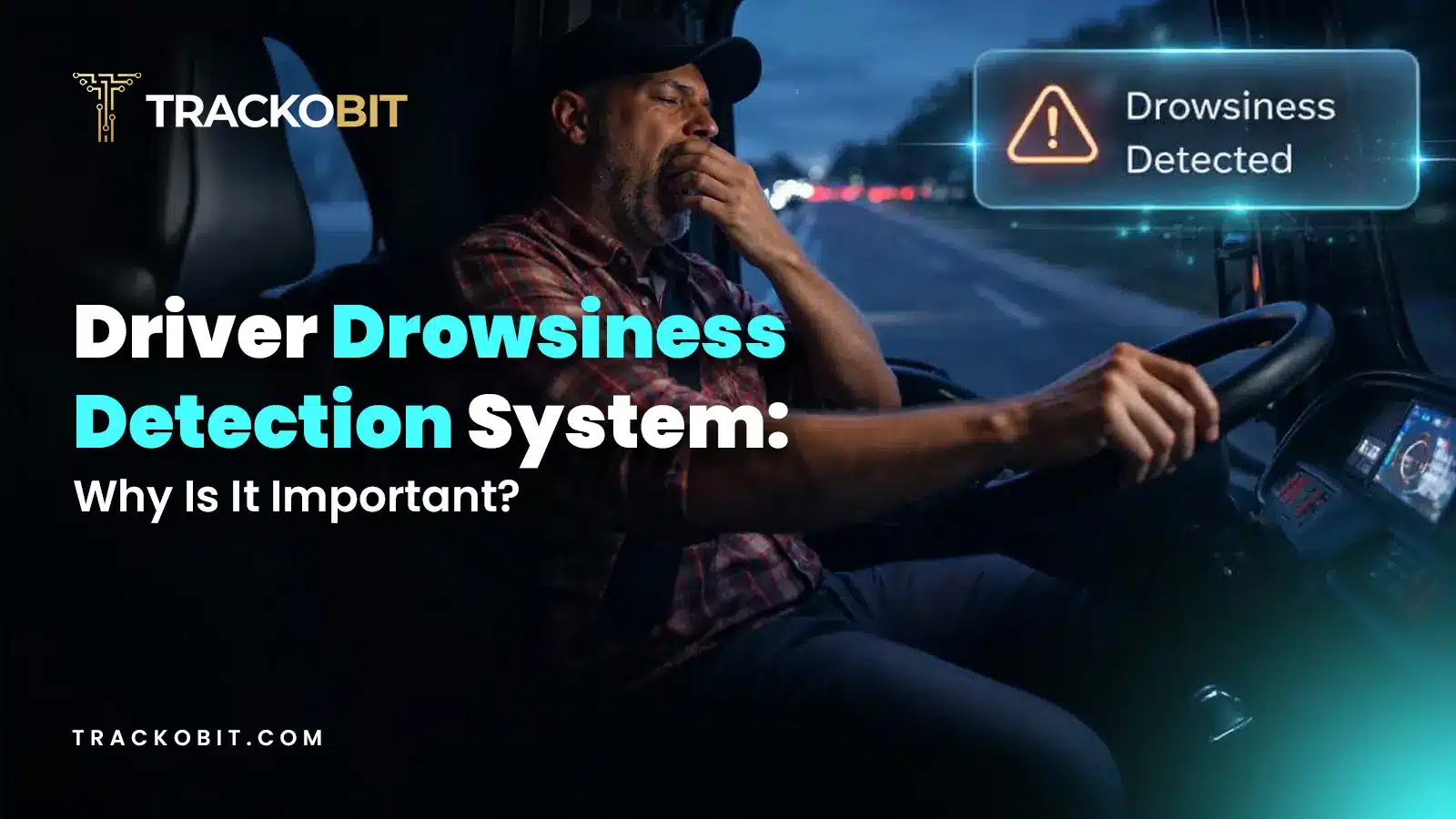
Why is Driver Drowsiness Detection System Important for Fleet Management?
Shemanti Ghosh February 4, 2026A driver drowsiness detection system is critical for fleet management. It helps prevent fatigue-related accidents and reduces operational risks through…
-
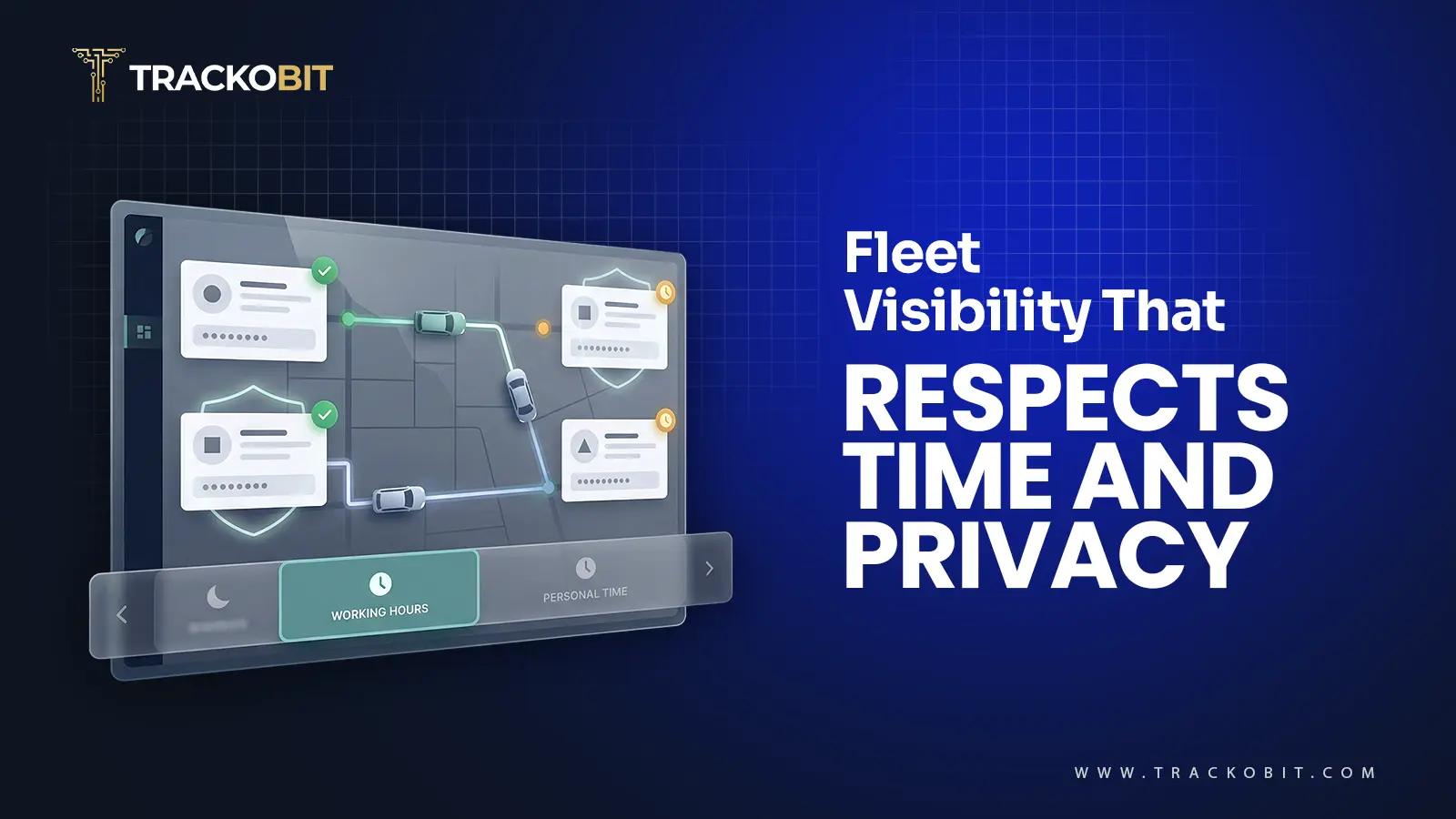
When Tracking Needs a Clock: Rethinking Fleet Visibility
Tithi Agarwal December 24, 2025Read on to understand why fleet tracking works better when it follows working hours. Because visibility should support operations, not…
-

What Makes TrackoBit’s Video Telematics Software Truly Next-Gen?
Shemanti Ghosh December 17, 2025TrackoBit’s video telematics software blends smart video intelligence with full server control. The result? Superior fleet reliability and safety.
-
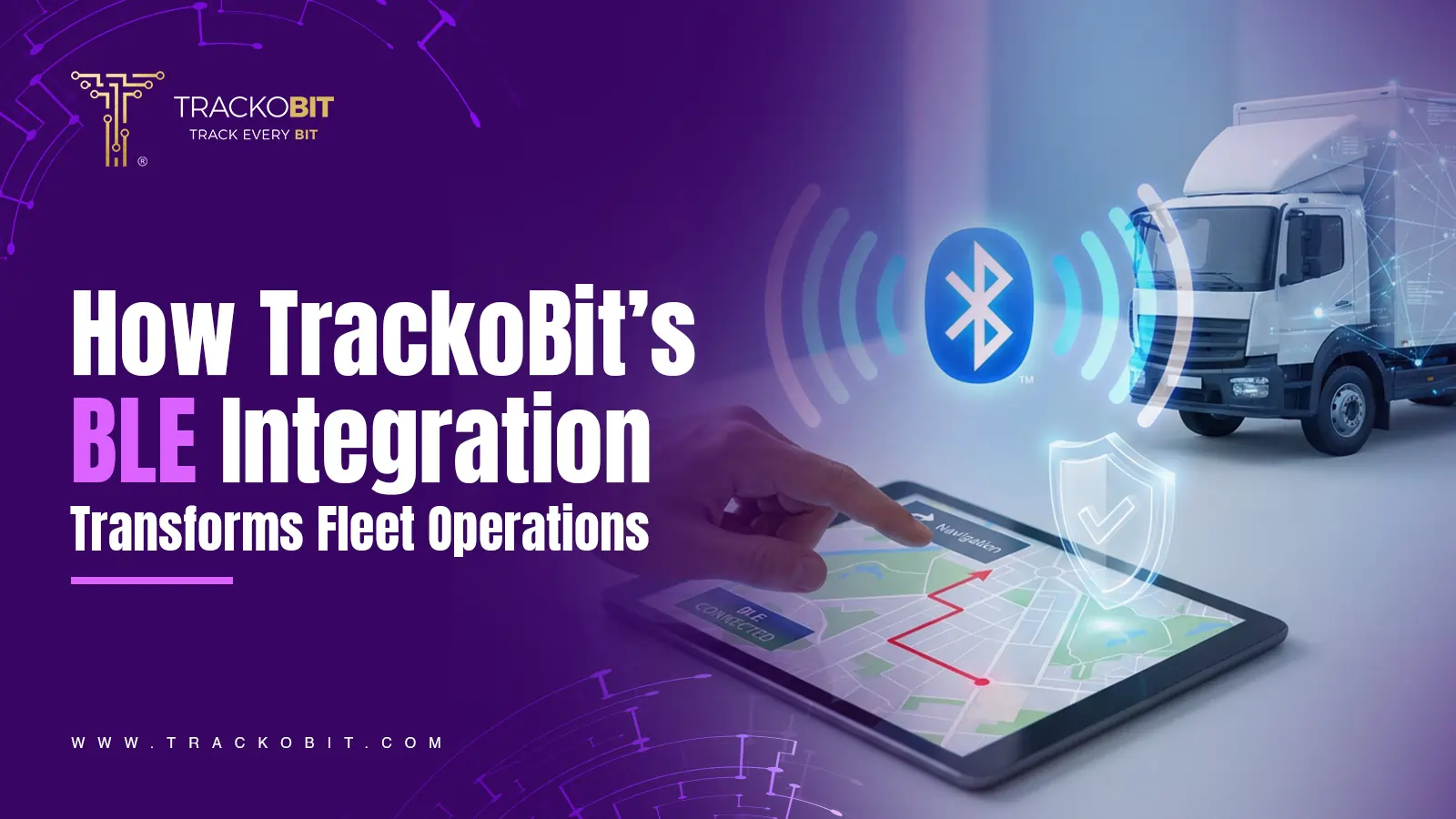
Plug, Pair, Perform TrackoBit Introduces BLE Sensor Integration
Tithi Agarwal November 26, 2025TrackoBit’s BLE Sensor Integration enables wireless, real-time monitoring with faster installs and accurate insights. It improves fleet efficiency, visibility, and…

Subscribe for weekly tips to optimize your fleet’s potential!
Your inbox awaits a welcome email. Stay tuned for the latest blog updates & expert insights.
"While you're here, dive into some more reads or grab quick bites from our social platforms!"Stay Updated on tech, telematics and mobility. Don't miss out on the latest in the industry.
We use cookies to enhance and personalize your browsing experience. By continuing to use our website, you agree to our Privacy Policy.



































